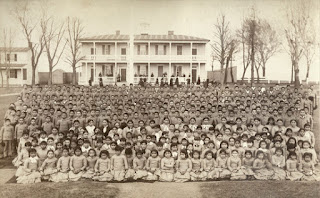Deculturalization of Native Americans
"Deculturalization and the Claim of Racial and Cultural Superiority of by Anglo-Americans"
by: Joel Spring
Spring argues that European leaders invaded Native American lands with the attitude that the Native American culture was inferior to their own. The Native Americans were stripped of their culture through the education system put in place by Anglo-Americans so that they would willingly sell their land.
"The Indian Boarding Schools"
by: Michele Bollinger
In her text, Bollinger focuses on the Indian Boarding Schools from the 1870's to the 1960's. She argues that the Indians endured treacherous conditions in these boarding schools from very young ages.
Torture of the Native American Culture
These two texts emphasize the torture that was done to Native Americans and their culture by the Anglo-Americans. The Anglo-Americans were hungry for land and power and they took advantage of a culture that did not emphasize land and wealth. They in fact called the culture inferior to their own in order to rationalize their actions. Education was used to "deculturalize" the Indians by teaching young children that the Anglo-American culture was the "right culture" and the Native American culture was lesser. Spring states, "schools were created to destroy Native American cultural and linguistic traditions and replace them with the English language and Anglo-American culture." Native American culture was to be wiped away. Some ways this was done as Bollinger points out are, "separation from family and community, child labor, physical torment, and sexual abuse." Indians also had to cut their hair and were not allowed to speak their own language in school. Anglo-Americans wanted the Indian culture to die whether it was through the Indian massacres or the massacre culture through the children in schools.
This reminded me of a story we read in fourth grade about Jim Thorpe. He was an Indian tribe member who went to boarding schools and eventually became a great athlete. However, when he was a member of the boarding schools from a young age he was stripped of everything that made him an Indian: his language, hair, traditions. Yet, when I went to research his life further, I did not find any information about the treatment he faced in the boarding schools. I find it very interesting that this piece of his life is left out of the biographies like this one. His accomplishments are all outlined, but the deculturalization of his tribe is not in the biographies. It seems as if it is hidden.
This video allows you to hear some of the voices from Indians in boarding schools. You can hear the pain and hurt that they went through. The images also give us a small glimpse of what life in the boarding schools was like.
I believe this quote from Bollinger wraps up the inhuman treatment of the Indians:
"At the heart of these schools was a barbaric form of racism-one that aimed to strip American Indians of any semblance of cultural identity, tradition and spirituality."


Hi Jill!
ReplyDeleteI found your blog to be very interesting, especially where you talk about Jim Thorp. You are absolutely right that part of his life is completely erased! I wonder if leaving this part of his life out of his biographies was his idea or the idea of those who wrote his biography? And if it was the idea of those who wrote his biography, I wonder if they were White?
Hi Jill --
ReplyDeleteThoughtful post.
I'd add that it's important to note that Indigenous people DID emphasize land, but it was a different relationship to land that was not based in property or exploitation -- and so it was at odds with the early capitalist views of settlers.
It's funny how in U.S. today, private ownership of property is a cultural given, a norm. We've been so socialized into it that it's hard to imagine alternative arrangements.